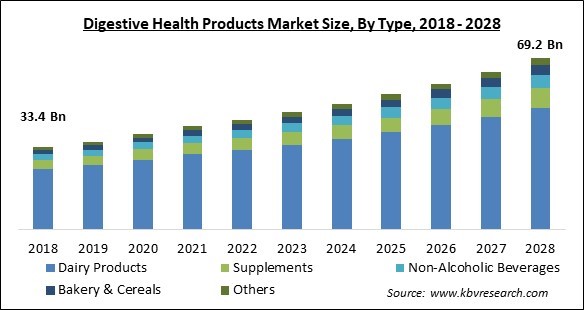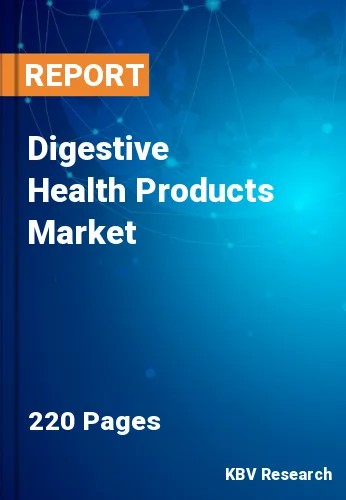The Global Digestive Health Products Market size is expected to reach $69.2 billion by 2028, rising at a market growth of 7.7% CAGR during the forecast period.
Digestive health products are specific products that support gut health. These products are foods, functional ingredients, and supplements made from organic plants, animals, or microbes that help to prevent digestive issues. Inflammatory bowel disease, irritable bowel syndrome, constipation, colic, and ulcerative colitis can all be avoided with the aid of digestive health products. These products also aid in building immunity and battling harmful microorganisms.

Also, due to consumer lifestyle changes and rising mal-absorption rates, people are eating less, which is expanding the digestive health products market. Consumption of items for digestive health is anticipated to increase as a result of consumers' increasing willingness to pay a little bit more for better health. Different portions of the digestive tract require regular maintenance due to their delicate nature, and sustaining their wellbeing by using digestive health products has developed as a significant wellness trend in many areas of the world.
The main goals of digestive health products are to maintain a normal level of stomach acid and replenish healthy gut flora, both of which are crucial for the breakdown and absorption of all nutrients in food. Lipase, amylases, and lactase are a few of the digestive health products' enzymes that help maintain healthy levels of stomach acid and enhance digestion. One of the main factors boosting the market for digestive health products is the rising demand for nutritious food additives and nutritional supplements.
The dairy industry is anticipated to have a significant demand for digestive health products for usage in milk, cheese, yoghurt, and beverage goods. Due to expanding probiotic and food enzyme usage in newborn formula as well as rising adult health concerns, these products are anticipated to drive market growth over the next years. The market will also be driven by the rising usage of digestive health products in healthcare and certain medical problems.
Due to the COVID-19 outbreak, the market for digestive health goods experienced mixed results. Despite the limitations that the nations must adhere to, the market for natural digestive health supplements is quickly rising. People are making an effort to keep up healthy routines and consume nutritive health items in light of the coronavirus outbreak. The health advantages of core health supplements for digestive health during this pandemic are now widely known. However, the lack of production as a result of the labour shortage and shutdown decreased demand for digestive health goods. So, the COVID-19 pandemic's effects on the market were uneven.
The increased need for nutritive and fortifying additives is one of the key reasons that is projected to propel expansion of the market for digestive health products. Companies that produce food and beverages add enzymes, prebiotics, and probiotics to their products to strengthen the nutritional and digestive components. The purpose of adding additives to the food and beverage sector is to boost the nutritional value and fibre content of food products. In order to reduce the risk of cardiovascular disease and improve the quality of gut bacteria, probiotics and other digestive ingredients are frequently present in fish oil and yoghurt.

There is an expansion of ageing population and increased consumer awareness of gastrointestinal health across the world. The digestive system's efficiency declines with age, and the muscles that process food in the digestive tract become inflexible, weak, and less effective. Intestinal inflammation and other irritable bowel diseases including Crohn's disease and ulcerative colitis, have been the cause of a number of fatalities in the western world in recent years. The market for digestive health products is anticipated to be stimulated by consumers' increased awareness of the importance of gut health.
Market limitations include stringent government laws governing prebiotics and probiotic regulatory norms, as well as the numerous approvals and trials, which producers must go through before releasing a product in the market. A company is in charge of assessing whether or not a supplement is safe under a 1994 law on dietary supplement health and education. Since, supplements and most digestive health products don't necessarily fall under medicine schedules of many nations, it then becomes comparatively tricky to get the required permissions. The categorization of many digestive health products remain dismissal, especially in developing nations.
Based on type, the digestive health product market is segmented into dairy products, bakery and cereals, non-alcoholic beverages, supplements, and others. The non-alcoholic beverages segment garnered a substantial revenue share in the digestive health product market in 2021. It is due to factors including the growing popularity of these beverages owing to their lack of alcohol's negative effects. They act as a healthy substitute for their alcoholic equivalents. It's commonly recognised that non-alcoholic beer is beneficial for nursing mothers.
On the basis of ingredients, the digestive health product market is categorised into prebiotics, probiotics, and food enzymes (Microbial-based, Plant-based and Animal-based). The probiotics segment witnessed the largest revenue share in the digestive health product market in 2021. This is due to a greater understanding of the advantages probiotics have for health, including the reduction of inflammation and allergies, the treatment and prevention of diarrhoea, and the enhancement of immunity. Digestive diseases, immunity, and the digestive system can all be helped by probiotic substances.
| Report Attribute | Details |
|---|---|
| Market size value in 2021 | USD 41.6 Billion |
| Market size forecast in 2028 | USD 69.2 Billion |
| Base Year | 2021 |
| Historical Period | 2018 to 2020 |
| Forecast Period | 2022 to 2028 |
| Revenue Growth Rate | CAGR of 7.7% from 2022 to 2028 |
| Number of Pages | 220 |
| Number of Tables | 370 |
| Report coverage | Market Trends, Revenue Estimation and Forecast, Segmentation Analysis, Regional and Country Breakdown, Companies Strategic Developments, Company Profiling |
| Segments covered | Type, Ingredient, Region |
| Country scope | US, Canada, Mexico, Germany, UK, France, Russia, Spain, Italy, China, Japan, India, South Korea, Singapore, Malaysia, Brazil, Argentina, UAE, Saudi Arabia, South Africa, Nigeria |
| Growth Drivers |
|
| Restraints |
|
Region wise, the digestive health product market is analysed across North America, Europe, Asia Pacific, and LAMEA. The North America region acquired the highest revenue share in the digestive health product market in 2021. High market share in the region is a result of the region's leading players having a strong presence, government assistance for new product development, and technological improvement in the probiotic and prebiotic space. Additionally, factors such as rising healthcare costs, modifications to food laws that affect label and product claims, quick advances in science and processing technologies, an increase in the number of elderly people, and a growing interest in achieving wellness through diet are driving consumer interest in digestive health products in North America.
Free Valuable Insights: Global Digestive Health Products Market size to reach USD 69.2 Billion by 2028
The market research report covers the analysis of key stake holders of the market. Key companies profiled in the report include BASF SE, Bayer AG, Danone S.A. (Sofina Group), DuPont de Nemours, Inc., Nestle S.A., Sanofi S.A., Cargill Corporation, Chr. Hansen Holding A/S, International Flavors & Fragrances, Inc., and Arla Foods, Inc.
By Type
By Ingredient
By Geography
The Digestive Health Products Market size is projected to reach USD 69.2 billion by 2028.
Growing Demand For Nutritional And Fortifying Additives For Food are driving the market in coming years, however, Strict, Uneven And Uncategorised Regulations Around The Globe restraints the growth of the market.
BASF SE, Bayer AG, Danone S.A. (Sofina Group), DuPont de Nemours, Inc., Nestle S.A., Sanofi S.A., Cargill Corporation, Chr. Hansen Holding A/S, International Flavors & Fragrances, Inc., and Arla Foods, Inc.
The expected CAGR of the Digestive Health Products Market is 7.7% from 2022 to 2028.
The Dairy Products segment acquired maximum revenue share in the Global Digestive Health Products Market by Type in 2021 thereby, achieving a market value of $49.2 billion by 2028.
The North America market dominated the Global Digestive Health Products Market by Region in 2021, and would continue to be a dominant market till 2028; thereby, achieving a market value of $24.6 billion by 2028.
Our team of dedicated experts can provide you with attractive expansion opportunities for your business.

